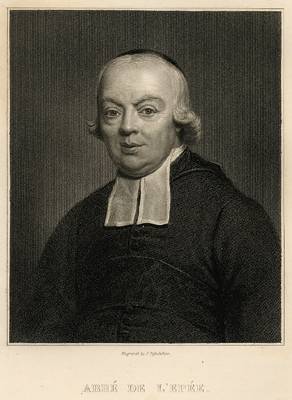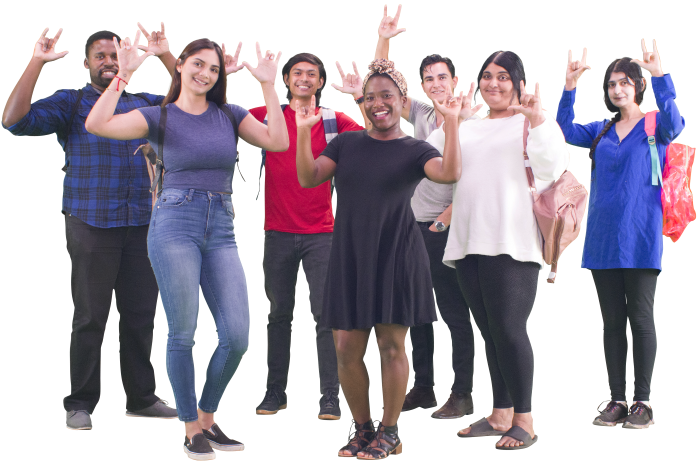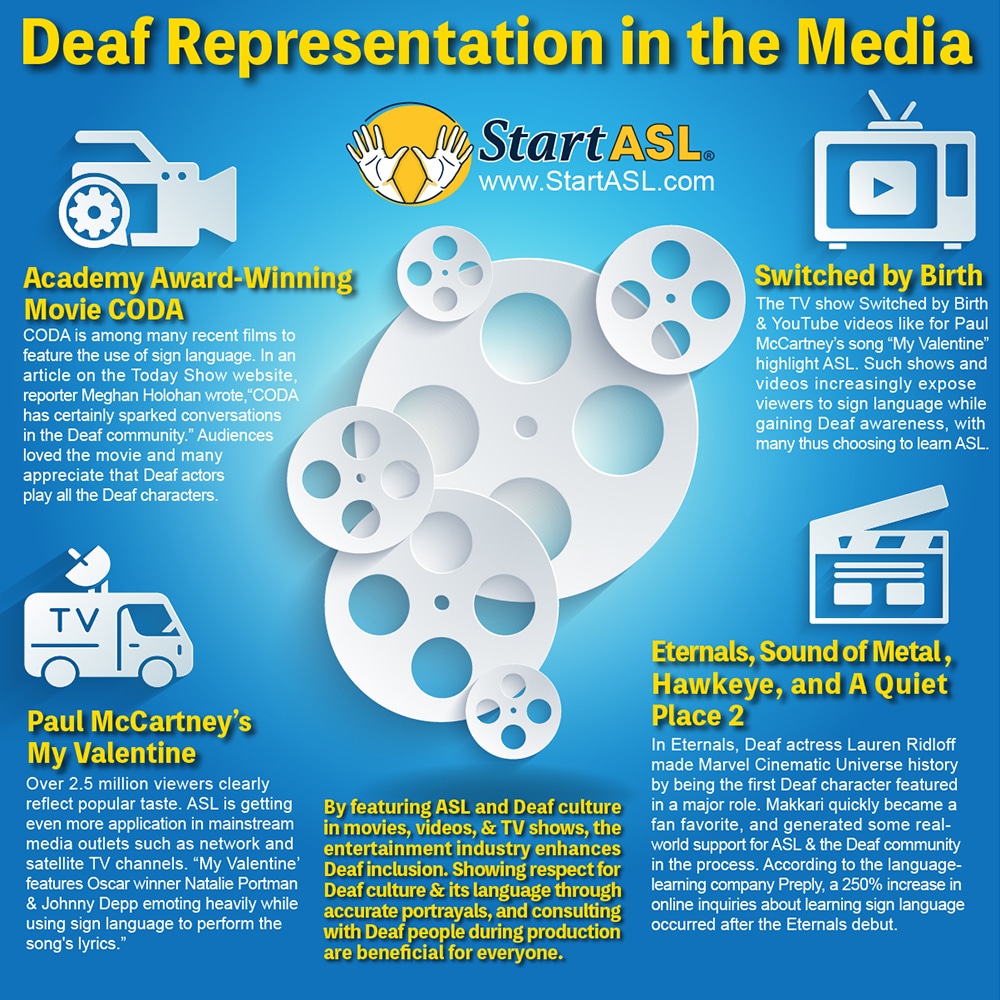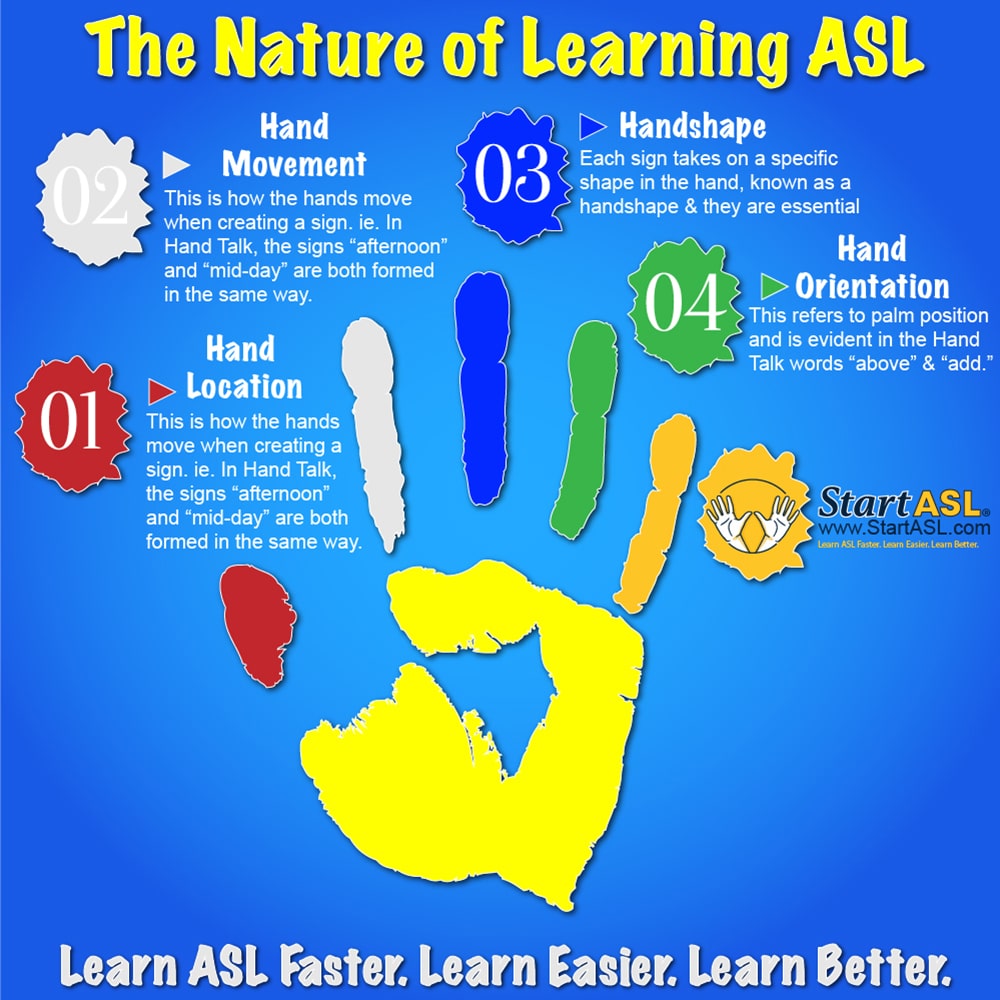
Abbe de L’Epee
- by Michelle Jay
- No Comments

Abbe de L’Epee, a French Catholic priest, founded the first social and religious association for deaf people around 1750. L’Epee’s full name was Abbe Charles Michel de L’Epee and he was one of the most important people in the history of sign language.
A common story retold throughout the history of sign language claims that L’Epee encountered two deaf sisters by chance when visiting a poverty stricken area of Paris. Their mother wanted him to educate her daughters in religion. After discovering their deafness, he wanted to educate the sisters. Soon after, he completely dedicated his life to educating the deaf.
Abbe Charles Michel de L’Epee established the first public free deaf school in 1771. This school is now called Institut National de Jeunes Sourds de Paris (or the National Institute for Deaf Children of Paris). In English, the school was originally known as the National Institute for Deaf-Mutes. Deaf children came from all across France to attend the school. The deaf children had signed at home then brought these signs with them to the school. L’Epee learned all of these different signs and utilized the signs he learned to teach his students French.
These signs soon became a standard signed language L’Epee taught to the students. More schools were founded and the students brought this language back to their neighborhoods. The standard language L’Epee used is known as Old French Sign Language. This language spread across Europe as more students were educated.
Today, Abbe de L’Epee is known in Deaf history as the “Father of the Deaf” because of the twenty-one schools he established and all he has done for the deaf.
Abbe de L’Epee Articles Submitted by Students
Who is your favorite person from Deaf history?
Abbé Charles-Michel de l’Épée – Father of the Deaf
by Olivia Gundrum | October 19, 2020
Sign language has been around for centuries. Its origin is unclear, but many people believe Abbé Charles-Michel de l’Épée gave it its name. He is best known as the “Father of the Deaf.” (Rumson). As an adult, l’Épée’s life was changed drastically when he met members of the deaf community, which led to his many accomplishments and laid the groundwork for the future of sign language.
l’Épée thought he had an understanding of what he wanted for his future career until his ambitions shifted in a whole different direction. He was born into a very wealthy family in November of 1712 (“Charles Michel de l’ Epee”). He studied to become a priest but was declined for a license to officiate. l’Épée took a different approach to his life and started helping out the less fortunate. He was introduced to two French girls and their mother who wanted him to instruct them about religion. When he discovered that they were both deaf, he dedicated his whole life to educating them. In a way, he wanted to give the girls a new life. l’Épée’s way of seeing sign language was, “teaching deaf people through the eye what other people acquire through the ear.” (Rumson) He was a pioneer in educating the deaf community.
I’Épée wanted to take his passion farther and to be able to impact others just like those two girls. At that time though, any school for the impaired was only for the wealthy. That inspired l’Épéen to open the first public academy called the “National Institution for the Deaf and Mute of Paris.” He wanted everyone to be able to attend, and he used all of his inheritance to make it happen. He ended up starting twenty more schools. In addition, he established the world’s first signed alphabet and formulated a method to teach it. l’Épéen started using hand signals from the French language which later became The French Sign Language (“Charles Michel de l’ Epee”). Later, he was also able to demonstrate that the deaf community was fully capable of integrating with the hearing and that they should have the same opportunities. In addition to I’Épéen’s accomplishments, he wrote “Educating Deaf-Mutes Using Methodical Signs.” He began writing a general dictionary of signs but unfortunately was not able to finish it before his death. l’Épée’s contributions to the deaf culture were extremely various in the works he did.
l’Épée had done so many amazing things for the deaf community in his life and also inspired others after he died. Since he was not able to finish writing the dictionary, Abbe Sicard completed it (Cengage). He was one of l’Épée’s students who eventually became the new principal at his institution. He was a bridge between the French and American sign language. Sicard and another man instituted the first deaf school in America. They brought the two languages together and made the American sign language. While l’Épée was not physically a part of this incredible advancement his work was the inspiration
l’Épée left behind an incredible legacy for the deaf community. He fell in love with a language that wasn’t really thought of or talked about and remade it. People from every part of France came to attend his school and they went back to teach others. He was known as the “Father of the Deaf” who was a pioneer to the sign language community. l’Épée had no plans of going down this path, but because he did, he influenced an incredible culture, accomplished various works, and inspired so many people.
Works Cited
Cengage. “Charles Michel De L’épée.” Encyclopedia, 29 Oct 2019, www.encyclopedia.com/history/encyclopedias-almanacs-transcripts-and-maps/charles-michel-de-l-epee. Accessed 15 Oct 2020.
“Charles Michel de l’ Epee.” YourDictionary. LoveToKnow. biography.yourdictionary.com/charles-michel-de-l-epee.
Jay, Michelle. A Student’s Guide to ASL and the Deaf Community. Los Angeles, CA, Judea Media, 2011.
Abbé Charles-Michel de l’Épée
by Mary Bolin | July 20, 2017
I am very interested in the Abbé Charles-Michel de l’Épée, who pioneered Deaf education in France and started a school for Deaf children, l’Institution Nationale des Sourds-Muets à Paris in 1771 after having encountered two young Deaf girls in an impoverished area of Paris. He collected and organized the signs that Deaf people were already using in France, and developed teaching and learning methods. His systematized collection of signs is called Old French Sign Language. Striking things about his story include the fact that he understood that sign language was the best way for Deaf people to communicate and that he learned and used signs that they had already developed. It led to recognition of the needs of Deaf people. Wikipedia adds some interesting information to his story, including the fact that he was never actually ordained as a priest! (Due to political situations at the time.) It is also interesting that Deaf education became a public matter in Europe during the Enlightenment, when there were so many advances in science, human rights, education, philosophy, and so on. Abbé de l’Épée’s work influenced other educators in France, including Laurent Leclerc, and was a source for some later developments in the history of American Sign Language. Despite competing theories and methods such as Oralism, sign language eventually “won” as the preferred and predominant method of communication for Deaf people. I am interested in de l’Épée’s work from the point of view of linguistic analysis and historical linguistics. It is rather amazing that it took until 1960, when William Stokoe wrote his dissertation, for ASL to be recognized as a “real” language. Sophisticated linguistic analysis has been practiced since at least the 19th century, and it could have been recognized much earlier that ASL has a systematic structure, including morphology, syntax, semantic structure, and the equivalent of phonology. The 19th century saw huge breakthroughs in historical linguistic analysis. It is too bad that sign languages were not really included in that analysis, because it could have provided amazing information on how sign languages have developed, grown, changed, and spread.
All Men Are Created Equal
by Barbara Childress | May 31, 2017
Even though Abbe Charles Michel de L’Epee did not invent “sign language”, he is my favorite historical figure in Deaf History. His desire to include deaf children in the learning and practice of religion speaks highly of his heart for all of mankind.
In many historical settings, priests, educators and missionaries have shown the love of God to all people despite race or abilities. All the way back to the Old Testament, when the prophet Malachi proclaimed “Do we not have one father? Has not one God created us? Why does each of us act deceitfully, each man against his brother, to profane the covenant of our fathers?” ( Malachi 2:10, International Standard Version)
Even the Apostle Paul’s teachings in the New Testament were based on the premise that God’s salvation of all mankind was not based on “Jew nor Greek…bond or free…male nor female: for ye are all one in Christ Jesus”. (Galatians 3:28, King James Version)
Upon the influence of an Italian teacher, Phillip Mazzei, Thomas Jefferson, along with four others, wrote that all men are created equal in the 2nd paragraph of the U. S. Constitution.
The ongoing passion of many important people has brought about the opportunity for everyone to become educated, protected and encouraged to pursue Life, Liberty and Happiness.
I think Abbe De L’Epee was surrendering his heart to a higher calling that took bravery and fortitude. No doubt, there were objections and possibly, threats, but he forged his way through difficulties to bring about a way for deaf children to learn of the Love of God. In the process, God used Abbe de L’Epee to prepare the way for the manual alphabet as well as a shift in society to view all men/women and children equal and capable of education, expression and communication.
Father of the Deaf
by Debbie Cirre | May 25, 2017
At a time in history when deaf people had no rights and were even considered unteachable, one man emerged who opened the doors and changed the course of deaf education. Abbe Charles Michel de l’Epee, known as the “Father of the Deaf”, is my favorite person from deaf history for this reason. He unlocked communication and developed successful educational methods for deaf people in France. His work inspired other countries to follow his methods as well, bringing new opportunities to deaf people around the world.
Charles Michel de l’Epee was born in 1712 to the architect of King Louis XIV. He became a priest and, when hopes for a higher position were dashed, chose to focus on helping the poor. A story is told that Abbe de l’Epee was asked to teach religion to two girls who were deaf. Because of this encounter, he was inspired to teach deaf children. Eventually he established the first school for the deaf in France, The Royal Institution of Deaf Mutes, in 1760. It was a free school, and open to the public. Originally funded by de l’Epee himself, the school began receiving government funding in 1791.
More than two hundred years before ASL was declared an actual language with its own syntax and grammar, Abbe de l’Epee believed that sign language was the natural language of deaf people. He invented a one-handed manual alphabet and used signs he learned from the deaf children themselves to develop a sign language which he used to teach his students French. This signed language, now known as “Old Signed French”, was used only in the classroom, as students preferred their own community sign language for communication.
De l’Epee published about his work in 1760, and other countries were intrigued by his success. They sent people to learn his methods of deaf education, hoping to bring the information home and help the deaf people in their own countries. Nine foreign students established schools for the deaf around the world using l’Epee’s methods. Ten French students began eight schools within France. Education for the deaf spread and l’Epee’s methods even found their way to the New World.
Abbe de l’Epee was a staunch advocate for deaf people. Thanks to his work, deaf people gained access to religious services and could legally defend themselves in court. Two years after his death in 1789, the National Assembly honored him with the title “Benefactor of Humanity.” The Assembly also said that deaf people had rights under the Declaration of the Rights of Man and of the Citizen.
Abbe de l’Epee was a pioneer for deaf rights and education at a time when deaf people had neither. His openness to learning from the deaf opened the doors to their education and paved the way to their being recognized as people with rights and opportunities. He has truly earned the title “Father of the Deaf” and is a great example to all who seek to interact with the deaf community.
Abbe de L’Epee
by Gideon | December 7, 2013
My favorite sign language hero would have to be Abbe de L’Epee. L’Epee is one of the most important people in deaf history. He was the first recorded person to care for the deaf people and their problem of not being able to communicate. L’Epee was inspired to devote his life to deaf education after meeting two deaf sisters in a poor neighborhood in Paris.
L’Epee established the first school for the deaf in 1771 and called it the National Institute for the Mutes (mutes being what they called deaf people back then). When the school was established they began educating deaf people from all over France and he used the signs the children used at their homes to teach them French. This soon became the standard sign language Abbe taught.
Soon more schools were establish and what the children learned at the schools they brought back to their towns and communities, and this was a way sign language spread throughout Europe. L’Epee established twenty-one deaf schools and became known as the “Father of the Deaf” for all his great works with deaf. Abbe believed that sign language was the natural language for the deaf.
L’Epee is my favorite for many reasons. I admire him for out of everything he could have done with his life he chose to help people in need and founded a working language for the deaf that would change the world of communication with the deaf. He selflessly dedicated his entire life to making a working language for the deaf and then teaching it to them. L’Epee definitely deserved the title “Father of the Deaf”.
Abbe Charles Michel de L’Epee
by Anonymous | July 23, 2013
I really enjoyed learning about Abbe Charles Michel de L’Epee and all that he did for the deaf people. At that time, deaf people were treated very poorly, as if they could not ever be educated. He was among the few who believed in helping the deaf.
I respect what he did, first beginning with the two girls he worked with, then opening the National Institute for Deaf-Mutes and then eventually opening twenty one schools for the deaf. Many people who felt like they had no hope, found it in him and his schools.
He believed that just because a person did not have hearing, they still could have the same kind of education as everyone else. It is understandable how he became the “father of the deaf” as he paved the way for deaf education around the world.
Abbe Charles Michel de L’ Epee and Heather Whitestone
by Brandy (St. Cloud, Fl.) | March 8, 2013
I actually have two favorites. One being Abbe Charles de L’Epee because of his determination and compassion to open twenty-one free public schools for deaf children. Helping those in need and doing so with no expectations of money or rewards. He showed courage to stand up for what he believed in, to not be afraid of what others said or may have done to him because his opinion was so different than theirs.
He wore love on his chest like a bright shiny medal for all to see. He shared that love with those who had felt unloved and different, letting them know that he was a voice to the lost and that he would stand up for them and not give up nor let them down.
My second favorite is Heather Whitestone. In 1995 she showed America that being different was not so different at all–by winning the Miss America Pageant. She showed that you can achieve the impossible as long as you push yourself and never settle for no. She showed that if you can see it, you can achieve it–if you believe it, you can reach out and take it and to not let anyone tell you that you’re not capable of fulfilling your dreams no matter what they are.
She showed that you are a person just like everyone else and that you are beautiful just the way you are–that we are all the same and we all share one common factor and that is the capability to love and love unconditionally. So I say, be kind to one another, show love and compassion every chance you get. Never give up on yourself and love one another as well as yourselves for that is what really matters in the end.
Abbe Charles Michel de L’Epee
by Sharon Daniell (Trinidad and Tobago) | May 8, 2015
My reason for choosing Abbe de L’Epee as my favorite Deaf historian has to do with the fact that he took the time to educate the Deaf people. The story of how he started is inspiring and makes for good story reading; that is the story of the two Deaf sisters. He had to be a compassionate and caring man to take the time to teach the sisters. De L’Epee could have stopped there but he continued to teach other deaf students. He took the time to study methods used before to teach other students and he even used his own methods. De L’Epee gave Deaf students a hope causing many of them to be educated from around the world. He offered free education which showed that he was selfless. He helped to put a format to sign language that would day be recognized. As said in the article on Deaf History he is considered the Father of the Deaf. I think he really fathered them and I am really glad to have read about him and how he helped the Deaf community. Imagine going so far as to establish 21 deaf schools. This shows that this man had a great heart for the underdog. He was a fantastic human being who helped his brother the way God wants us to help each other. I hope that there will be many more people like Abbe de Le’Epee who can champion the cause of the deaf. It is because of people like him that they have survived to become a people worthy of notice and be given their rights like any citizens of a free country.
Father of the deaf
by Stacey Neifert (Winchester, KY) | December 15, 2015
My favorite historical figure is of course Abbe de L’Epee I will admit I don’t know much about the deaf community, culture or history aside from what I have learned during this online class. every time I find myself doing a reading assignment I’m almost in tears learning in detail about this incredibly rich history this is especially so reading about Abbe de L’Epee. learning how he was so inspired to teach those two sisters about religion after he found out they were deaf and soon after he dedicated his entire life to not just teaching the deaf but learning from them. when he first opened a free public school for the deaf something that really stood out to me as I’m reading about this man is when it said the students signed at home and then would go to school and teach Abbe de L’Epee the signs and he would use them in his teachings. He truly is the father of the deaf I know hardly anything about this man aside from a short few paragraphs but I can really feel the respect he had for each person he taught and learned from. I can not wait to learn more about him, his impact on so many people, and deaf history!
Abbe Charles Michel de L’Epee
by Audrey Chaffin (Tennessee) | December 15, 2015
Of all of the brilliant people that have helped nourish the use of sign language in history, Abbe de L’Epee definitely stood out the most to me. I fully agree with his deserving the title “Father of the Deaf” because, in my opinion, he was the first to make a huge impact on the world regarding to the treatment and education of deaf people.
Epee believed that deaf people should be allowed a formal education in sign language, rather than being forced to speak using others’ method of oralism. This is important because, while I think oralism is acceptable if a deaf or hard of hearing person prefers that method, it is understandably more difficult than sign language and, in the time of Epee at least, seems a way of forcing the deaf community to conform to hearing culture. Epee learned from the deaf, rather than making them learn another way. He created the first school for the deaf, which was free of charge and open to the public. The open aspect of the school allowed sign language to be spread fluidly through the population. Epee even had a program for training foreigners to teach sign language. This inspired one student of the school to found the first school for the deaf in North America, leading to the creation of the basis of ASL!
I will admit that Epee’s version of sign language was questionable. It was much more difficult than what the French had been using, and some said that students never used it outside of class. I still respect Epee, though, as I don’t think he was intentionally making the language difficult, just more complex.
So nonetheless, I feel that L’Epee made a huge difference for the deaf community by bringing sign language into the eye of the public as a legitimate language and showing that the deaf community was as intelligent as the hearing and could be taught successfully without oral language.
Extra Sources:
https://en.wikipedia.org/wiki/Charles-Michel_de_l%27%C3%89p%C3%A9e
Abbe Charles Michel de L’Epee
by Danica (Canada) | December 15, 2015
Abbe Charles Michel de L’Epee devoted his life to helping others who he could barely even communicate with at first. He decided it was his job and duty to help the people that society didn’t think it worth helping. Not only did he open a school to help and teach these children, but he allowed those children to help him in doing so. Instead of creating a new language all by himself and informing the children of their new language, he asked the children how they communicate with their families, allowing the deaf children of France to use signs they had been using and felt comfortable and confident about. Not only did he collaborate with these brilliant young minds to create something new and beautiful, but the school was also free, which no doubt helped the parents of these outcast children and gave some relief and comfort that their kids would be able to make new friends that they could really understand and trust. I grew up in a French immersion school and I have always been very proud to consider myself a part of French culture and now I am even more proud to know that something so amazing, kind and life changing happened thanks to Abbe Charles Michel de L’Epee, a strong French man. Without him, who knows what would have happened to all those children who relied on him, how he changed all their lives and many more that came after his time.
Caring is the Key
by Amanda (Joplin, MO USA) | March 8, 2013
My favorite person from Deaf history would have to be Abbe Charles Michel de L’Epee born 1712 in Versailles. Before he came along, deaf people were cast aside and treated like they were useless to society and could not be taught anything.
L’Epee wanted to be a priest but because of his other beliefs, he was denied to be ordained. He then became a lawyer which led to him finally being ordained but he was not allowed to officiate. He decided to devoted his life to charities and helping the poor.
He came across two deaf sisters in the poor area of Paris. They were signing to each other. As he was watching them he became worried about their salvation and did not want them to go to hell. He got with a friend of his and established a shelter in 1760 to teach religion and education to the deaf. He discovered that deaf people were capable of communicating and receiving an education.
His shelter then became the first deaf school and was free and open to the public for education. He learned the signs that deaf people were already using and developed it into a teachable language. Because of the L’Epee, deaf people were then capable of defending themselves in court.
Twenty-one schools were established after that and after his death in 1789, L’Epee became known as the “Father of Sign Language.” One man cared for a certain group of people and opened the world’s eyes to the truth. Every human being has a meaningful place in this world.
I aspire to follow in his footsteps and continue to help deaf and hard-of-hearing and handicapped people to function in this society easier.
Charles Michel de L’Epee was a man of conviction and compassion. He helped change the world as we know it today by giving rights to regular people that might not have them today. We can all learn something from his life and carry the torch for others who are less fortunate or misunderstood.
Abbe de L’Epee
by Elise (Big Bear City, CA) | July 15, 2014
I am impressed most by Abbe de L’Epee and his effort to educate the deaf. After meeting two deaf sisters, he decided to dedicate his life to educating the deaf. After establishing the first free deaf school, he was able to learn all sorts of signs the students brought with them from their home and background and use them to teach his students. As a result, more schools were founded with students bringing back the language to their neighborhoods and homes.
I am impressed because he decided to do something to help the deaf learn instead of meeting the two sisters and wishing them well. He became involved and it clearly became his passion. It is because of people with passion like his, that we have seen the acceptance of ASL as a language and its resultant growth, popularity and even exposure in TV shows and movies. The deaf are no different from the rest of us who may speak different languages. They have their own language, culture and enjoy life as do others. Thank you Abbe de L’Epee for making the bold move to find out how to educate the deaf.
A man who saw beyond
by Betsy (Fort Collins, CO USA) | December 15, 2015
From what I have learned, I would say Abbe de L ‘Epee would have to be my favorite. because he saw beyond the title, notions, and ideas that had been set. He saw them as people. Devoting his life to reach out to this wonderful world of people that had been cast down for false reasons. He found that they where no different then him. He gave his life for theirs. I find that inspiring. I am learning ASL for I to have found a passion for these people. I desire to adopt children whom others have abandon and thrown out just because they are deaf. These are precious children who just need someone who loves them and lets them be them. Because of Abbe de L ‘Epee I will be able communicate with my children in way that they can feel free. First and foremost and for most I want them to know ASL from there is more up to them if they want to try anything or learn anything more. I will support them no matter what. Just like Abbe de L ‘Eppe supported the deaf. Thank you Abbe de L ‘Eppe for changing the lives of so many in your time and beyond your time! He gave his live for them, just as God gave His life for all and now I want to give my life for whom He has chosen.
Here’s to the teachers
by Avril (South Africa) | April 26, 2014
My strongest admiration goes out to those who teach deaf children and young adults – whether the teachers are themselves hearing or deaf.
Of course, from this page, all credit goes to Abbe de L’Epee for the patience and openness which he showed in learning from his students so that he could develop a proper language system. I have been a teacher for 8 years now, and I know that teachers can find it quite threatening when they don’t know “everything”, and they need to learn from their students. By being open to learning from his students, Abbe de L’Epee affirmed the identity and expertise of his students, and even in this small way he empowered each and every one of his students. Through his courage and humility, Abbe de L’Epee was able to open doors not only for his own pupils, but for many, many deaf people.
Likewise, I extend my admiration to all of those who developed this website and the learning resources found here. I am constantly aware, as I move through these units, how many thousands of hours it must have taken to get all of these resources together: videos, lesson plans, quizzes, workbooks, answer-checkers. What amazes me is the extent to which a resource like this website can empower the deaf community: empowering parents to communicate with their deaf children; empowering deaf children to master a language through which they can contribute to society; empowering hearing people to better understand the deaf community and, thus, increasing tolerance. It has been a dream of mine to become a teacher of deaf children, but here in South Africa, there are far fewer available resources to learn (South African) sign language. Through your work on this website, I am inspired to develop learning materials in order to boost the usage of South African Sign Language. While I understand that this is no small undertaking, I can fully appreciate the impact that such a website can have on both deaf and hearing people, and on society at large. So, you all are my inspirations, and I salute you! Teachers have the power to effect societal change at all levels, and I thank you for following your calling, as Abbe De L’Epee did, to bring about positive societal change.
Favorite Deaf Historical Figure
by Amber Howard (Los Angles, CA) | June 22, 2013
I’d have to say that after reading this article, Abbe Charles Michel de L’Epee is my favorite figure in Deaf history. He literally and figuratively opened the door for so many that society had written off. With all of the options available to us today, it’s hard to imagine a life so limited as it was for the Deaf at that time. L’Epee’s free schools for the Deaf is akin to what reading and writing were to African American slaves; A door to freedom or an opportunity to push the limits placed on them by societal norms of what was and wasn’t possible for the Deaf. His schools and his stance on the Deaf community was so powerful and profound, that it spread across Europe and beyond.
William Stokoe would be my second favorite figure in Deaf history. Thanks to arrogant efforts of Alexander Graham Bell, progress for the Deaf community was almost derailed. Due mainly because of the perseverance of the Deaf community to not let their language die, and the brilliance of Stokoe to prove the language’s validity once and for all, Deaf culture was given a more inclusive path into today’s society.
Language is EVERYTHING. It literally is what separates man from beast, this language validation was a major victory that might never have been were it not for forward thinking people like L’Epee.
Charles Michel de l’Epée
by Jaclyn Burroughs | June 22, 2017
Charles Michel de l’Epée was born in 1712, he founded the first school for the deaf. He is also known for being the first educator for the deaf. Michel first met twin deaf sisters through a man named Father Vanin, Vanin had been tutoring the girls with little success. When Vanin died l’Epee volunteered to take his place and began teaching the girls using hand signals and he had great success. He started insisting that deaf people must learn visually L’epee. did not hope to make himself rich by being paid a great amount to teach only wealthy children as other instructors had done. Instead l’Epee personally funded a public school for the deaf with his modest inheritance. l’Epee would dictate a sentence to his students using hand signals which they would write down in French, he had great success with his school he started in his home. Though he was teaching deaf children in Paris, talk about his success soon spread throughout all of France. l’Epee is known as one of the first to assert that deaf people were not senseless and were fully functional members of society. l’Epee spent most of his money funded his school, he had impoverished himself. Students reported that he went without heat in his home so that they could have fire in their rooms. L’Epee’s work also became know in other countries, Joseph II, Emperor of Austria, and Catherine II, Empress of Russia, sent him prospective teachers to train. l’Epee learned many other languages including Italian, Spanish, English, and German so that he could break the barriers and share his experience with others. About two years after his death the French Government officially funded and took over the institution just before the French Revolution. Charles Michel de l’Epée was succeeded by Abbe Sicard, Roch-Ambroise Cucurron, who was visited by Thomas Hopkins Gallaudet and Cucurron gave up a great teaching assistant Laurent Clerc to go back to America. Gallaudet and Clerc began the first deaf school in America in 1817. Charles Michel de l’Epée is my favorite person in deaf history, because not only did he take the time to get to really know deaf people he also passionately pursued education for them though many opposed him he still fought for education for deaf people. Though there were other people who educated deaf people before him, such as Two Spanish Benedictine Monks in the 1500’s, but they were unsuccessful in preserving against opposition. I believe de l’epee’s passion for teaching the deaf is what made him so well known and his passion made other countries want to get involved also. Charles Michel de l’Epée spared no expense for the deaf children to have a good life just as any other human being, he is also the connection to deaf schools in the United States. He was the beginning of a long hard fight, probably an inspiration to deaf people when people opposed sign language and tried to force Oralism. L’Epee died known as a virtual pauper in 1789, there was a bronze monument placed over his grave to honor him, he was also recognized as a benefactor of Humanity.
Enterprise Technology Analyst
by Teresa (Sacramento, CA) | July 13, 2013
To me, Abbe de L’Epee is my favorite person because he showed that deaf people could learn and be productive people just as much as hearing people. I think it is wonderful that he opened the school for deaf and also was willing to learn the sign language the students brought to the school and incorporate it into his teaching. I feel without him deaf people may still be in the dark ages.
I have taken several sign language classes in the past and my teachers were all deaf. My first teacher told us his history, how, as a child, he was taught to speak instead of sign and how frustrating that was for him since he couldn’t hear himself to know if he was even speaking correctly. His speech was difficult to understand but his parents insisted he would communicate by speech. They felt this made him more “normal”. I could tell he was much more relaxed with sign language than speech.
I am so thankful that L’Epee was part of their history and opened up the world to deaf people.
“Father of the Deaf” — Abbe Charles Michael de L’Epee
by Nadine Miller (Pennsylvania) | August 27, 2015
Abbe Charles Michael de L’Epee is my favorite person from Deaf History. He led the way in education for the deaf community. He was able to see a need for the deaf to become educated and believed that it was possible. By founding the first public free deaf school, he was showing that social status or wealth should not dictate your educational opportunities.
My favorite thing about his deaf school was not just that it was free and public. It was that it was an open learning environment. His goal was to educate deaf students from all over France who wanted to learn, but he was open to learning right along side of his students. He collected all the signs that his students brought with them from their homes and communities and compiled them into a standard sign language.
Teaching this standard sign language, also known as Old French Sign Language, must have done wonders for these students. Most of them were probably coming from a place where there were few, if any, other deaf people around. Now they were surrounded by people just like themselves. They had a sense of community, and a new language that allowed them to communicate with each other. They also didn’t have to feel as if they were worthless when in the school. They were all the same and could exist in an environment where they were looked down on for being different.
I think Abbe Charles Michael de L’Epee did more than just educate the deaf. I think he was able to give them a sense of community and belonging in a world that that they were worthless. I believe that is the most important thing he did for the deaf community.
No Limits
by Gloria (Philadelphia, PA) | March 8, 2013
The Abbe de L’Eppe is my favorite role model in deaf history. In a world where deaf people were considered unteachable and basically useless solely based on their inability to hear, the Abbe did not follow conventional thought and took the first step to bring equality in education and human rights to deaf people.
It probably would have been easy for him to ignore the mother’s request for the daughters to be educated or even just stop with them but he decided to devote his life to educating deaf people. He understood that the limitations put on deaf people were not self proclaimed limitations but rather limitations of ignorance and misunderstanding from people who had no idea what it is like to be deaf and no desire to understand.
I admire the Abbe not only for what he did for the deaf community but also for his role in enlightening hearing people as well. I believe any limitations we put on others are really limitations we put on ourselves, instead we should all strive to understand and support each other so we can all benefit from a smarter, brighter world.
Priestly Devotion
by Zengajive (Salt Lake City, UT, USA) | March 8, 2013
One French priest made an extraordinary impact on the education and lives of deaf people in France, and ultimately, the United States. His name is Abbe Charles Michel de L’Epee.
In the 1750’s Father de L’Epee was approached by a mother who wanted him to teach her two daughters about the Christian faith. The challenge was that these girls were deaf. Father -and later Abbe- de L’Epee worked with them, and found his calling in life. He spent his life dedicated to educating the deaf.
His approach was visionary. He gathered deaf children from various regions around France and LEARNED FROM THEM the signs they were using. He learned their language, and used it to teach the children French. Now they could communicate to their hearing family & community members. This produced a monumental change in their lives.
Thus Abbe de L’Epee established the first free public school for deaf children in 1771, in Paris, France. The language that developed is known as Old French sign language. Eventually more schools were established – 21 in all.
L’Epee demonstrated love, respect, and compassion to the deaf children through his dedication and approach to educating them and improving their lives.
My heart belongs to Abbe de L’EPee
by Julieann (La Carlota City, Philippines) | March 8, 2013
After reading the article, I fell in love with what Abbe de L’Epee had done for the world of the deaf people. Creating the first free school for the deaf was a huge step. It is greatly beneficial to those who have less money. Having an education for free is a blessing and his initiative to such endeavor is magnificent.
The free education for all is a great help for every deaf person. It is hope for them to be able to pursue more things in life. Having an education is priceless. Especially in the early centuries, education was just for the rich. Thus, the free education for everyone encompasses the social stigma, the barriers.
It spread the education throughout the places near and far. Thus, it broke barriers of communication, creating a social institution for the deaf where they can interact with their fellow deaf with no hesitation, open opportunities for all, friendship and camaraderie.
Free education for the deaf is very needed even up to this era. Let us all face it that even today if you have no financial resources, one cannot provide for their needs. Thus our brothers and sisters who are deaf need extra attention in order for them to attain and actualize themselves.
Hurray to Abbe de L’epee!
Abbe de L’Epee
by Anonymous | January 22, 2010
I have to say that Abbe de L’Epee is my favorite person from the history of sign language because he is a first timer. I know how hard it is to introduce something new to a group of people and it takes guts. Not many people would dare to go against the current. To believe that deaf people could communicate with a combination of hand signs, finger spelling and conventional gestures when everyone around him thought that they were stupid, unlearned and could not be taught, is amazing. He must have known that people would go against what he thought.
Abbe de L’Epee must have been a creative person, being that he developed a language that taught to first recognize, then learn the signs that were already being used by people in Paris, to this he added his own ideas. The result? A signed version of the French language. He made it easier for deaf people to have more of a standardized language of their own, one that would help bridge the gap between the hearing and non-hearing people.
I think that L’Epee was a very influential teacher in the deaf community. His teachings paved the way for a more standardized means of communication for the deaf. If L’Epee had not committed his life to wanting to help the deaf community learn a means of communication, today’s sign language would probably not be as we know it today. His creativeness and devotion was the basis for today’s American Sign Language.
Abbe de L’Epee
by Sean (VA) | | March 8, 2013
It is actually hard to pick just one because all of them played important roles. But if I had to pick just one I would pick Abbe de L’Epee because he saw a need and put his all into trying to help.
A lot of us today see many people in need of many different things and we think to ourselves, “I wish I could help,” then we give many excuses why we can’t. He seemed to be a humble man and he took what he learned from others, put everything together to come up with a language that helped A LOT!
I know I chose Abbe de L’Eppe but I also commend Laurent Clerc and Thomas Hopkins Gallaudet. Who knows, if Gallaudet didn’t travel to Europe to learn more about the deaf language over there and if Clerc didn’t drop what he was doing to come to America, where we would be right now?
I am deaf and life has not been that easy for me mainly because of a communication barrier. During this week I have already felt like my life is about to get a lot easier knowing ASL. I lost my hearing in middle school, so I was able to develop good speech skills but the problem with that is when you speak to a hearing person, a lot of them just assume you can hear too, which is not the case. :-)
Last but not least, Helen Keller. The people I mention before really had a HUGE impact. But Helen gave me the most inspiration. During the time when I was losing my hearing to the time where I could no longer hear I felt alone and lost. I wanted to give up in school because nobody was trying to help me. Everybody just kept saying pray about it and just read my lips.
Finally in high school I was at a fork in the road. One side was saying you can do it just keep pressing on and the other side was saying just give up life. I chose to quit but as soon as I made that decision I went to class one day and there was a guy who was deaf in there with an interpreter. He signed but I didn’t so we wrote notes back and forth. At the end of our conversation he told me to research the name Helen Keller. I read all about her which ended up bringing light into my life. She was deaf AND blind and was able to succeed which motivated me to press on. In a way, my friend in class and Helen saved me from ending my life.
And Michelle, I just want to thank you again for what you are doing. Even though I have done very well educationally I have been doing sort of poor socially. Ever since high school I wanted to learn ASL but my parents felt I didn’t need to learn. Then when I was out of the home I was determined to learn ASL but I had no money. Just a few weeks ago I cried out to God for help with this issue and then I found this site and I have been TRULY blessed. Thank you.
The Deaf Children
by Sue (Connecticut) | March 11, 2010
In my inept attempt to answer this question, I find myself so ignorant of Deaf history and culture and am amazed how little is taught in our schools. That being said, I am thrilled at the opportunity to now learn all I can on the subject and during this time, I am confident I will be able to answer your question with the experience and knowledge it so deserves.
However, I would like to give a visceral shot at an answer based on your writings. I think this is appropriate because I think sign language (like our early ancestors) originated from a visceral, instinctive desire to communicate with each other. And I think deaf children are the real heroes and my favorite people in Deaf History. I’m sure as I learn more about deaf history I will be able to choose my favorite person….but as you mentioned a few times… “deaf children from all over the world” attended the schools and were the ones that brought their own sign language to the forefront. So at this point, my gut says my favorite are all the deaf children of the world that never gave up on themselves in their quest to be heard!
I would like to thank you for your website which allows me to try something new and exciting…for free! I’m only on chapter 2, but your enthusiasm keeps me going! After completing all your units, I hope to go on to get certified and maybe teach or become a translator. One of my good friends is a translator, which is a great resource.
The Deaf Children in France
by Nancy Reynolds (Denton, MD, USA) | March 17, 2010
It may seem strange but these were the children that inspired others to realize how creative and intelligent the deaf really are. They not only devised the signs they could use to communicate but taught others to understand. In reading through deaf history I was amazed at how this influence spread down through every person captivated by the desire to communicate with this remarkable community of people.
From the very beginning until now when total communication is used there is this one overwhelming realization that the deaf are truly wonderful human beings that just need to be given a chance to be in the mainstream of American life-with equal opportunities and rights. Everyone for so long focused on the African-American fight for rights but looking at history the deaf have had the same struggles and their achievement is no less worthy of note.
I am also amazed at the people in history that were deaf that made their mark and no one remembers them as deaf but only their great contributions–Tom Edison, Juliet Lowe and then the contribution that Abraham Lincoln made to the advancement of deaf education. We have a Black History Month, President’s Day–why not Deaf History Month or Day. Seems appropriate, in seeing the great achievements of the Deaf Community.
Rebel!
by Robyn Bell (Toledo, Washington) | January 18, 2010
As a young man L’Epee had certain expectations given to him by the people around him. His father was a well-know architect and probably wanted a great many things from his son. L’Epee decided to study theology. Not a great career choice, but at least something with honor.
The French Catholic Church had decided to denounce Jansenism during L’Epee’s studies, which is a belief that all things are predetermined and that human nature is incapable of good. L’Epee refused to sign the ordinate that condemned this faith and was denied his ordainment. (Rebel!) Thus, he turned to law and was admitted to the Bar.
A cleric friend had introduced him to twins that were deaf and wanted to learn religion, when the cleric died suddenly, L’Epee took on their education. This was during a time when many deaf were considered non-persons and many laws were in place that restricted them. L’Epee could have been the man that many in his time were: stubborn, apathetic and socialists that turned away from those in need. Yet again L’Epee rebelled by embracing these individuals and teaching himself and the deaf common ground language.
Later, by founding the free school, he rebelled yet again. It was nearly unheard of to educate the deaf and only the extremely wealthy had the deaf tutored in oralism. The open school changed history and set L’Epee apart from any other deaf advocate in his time. As he wrote in his 1784 book, La veritable maniere d’instruire les sourds et muets, confirmee par une longue experience (The True Method of Educating the Deaf, Confirmed by Much Experience), “Religion and humanity inspire me with such a great interest in a truly destitute class of persons who, though similar to ourselves, are reduced, as it were, to the condition of animals so long as no attempts are made to rescue them from the darkness surrounding them, that I consider it an absolute obligation to make every effort to bring about their release from these shadows.”
What a wonderful example we have! Rebel and all!










